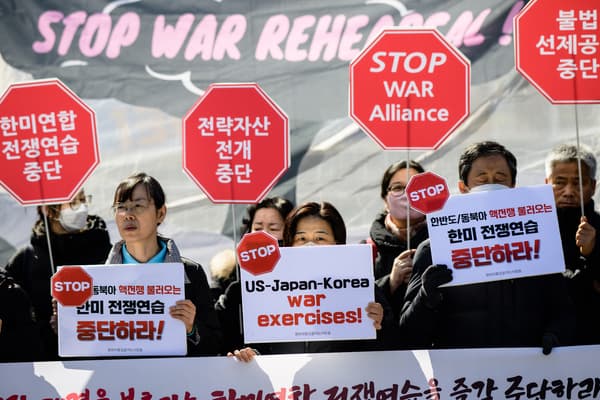South Korea and the United States began their biggest joint military exercises in five years on Monday, despite threats from North Korea, which announced hours before that it had fired two cruise missiles from a submarine.
Pyongyang said its firing was aimed at testing its “nuclear deterrents in different spaces,” while criticizing “Freedom Shield” exercises between US and South Korean forces, planned to last at least 10 days to combat growing threats from Pyongyang.
North Korea reported that “the two cruise missiles accurately hit the predetermined target in the East Korean Sea,” the official KCNA news agency reported, referring to the body of water also known as the Sea of Japan.
At least one North Korean missile on Monday
Current UN sanctions do not effectively prohibit Pyongyang from firing cruise missiles. However, tests related to its nuclear arsenal are not allowed. This test is linked to the fact that Seoul and Washington are “moving less and less covertly in their military maneuvers against” North Korea, according to KCNA.
South Korea’s Joint Chiefs of Staff reported detecting the launch of at least one unidentified missile from a North Korean submarine on Sunday, adding that US and South Korean intelligence services are analyzing the events.
Footage released in North Korean state media shows a submarine, the 8.24 Yongung, firing a missile into the sky, along with white smoke and flames.
Experts have expressed “significant doubts” about the progress of Pyongyang’s submarine program. For Park Won-gon, a professor at Seoul’s Ewha University, the transmitted images suggest that the missile was fired above the surface of the water. “In this case it is useless (to shoot) from a submarine” because it is not stealthy, he told AFP.
defensive drills
The “Shield of Freedom” drills “involve warfare procedures to repel potential North Korean attacks and carry out a stabilization campaign in the North,” the South Korean military said.
These exercises are “defensive (and) based on a joint operational plan,” insists the South Korean Joint Chiefs of Staff.
All of these drills draw the ire of Pyongyang, which sees them as dress rehearsals for an invasion of its territory, and regularly warns against “overwhelming” action in response to them.
“North Korea uses missiles to (denounce) joint exercises,” argued Go Myong-hyun, a researcher at the Asan Institute for Policy Studies in Seoul, “wanting to emphasize that the reason for developing missiles is for self-defense purposes.”
North Korea’s foreign ministry also issued a statement Monday criticizing “vicious extortions of American ‘human rights'” after Washington said it would convene a UN meeting this week on the human rights abuses in North Korea.
North Korea will ‘never give up’ on nuclear power
In 2022, the North called its nuclear power status “irreversible” and conducted a record number of ballistic tests in violation of UN resolutions. On Friday, KCNA reported that Kim Jong Un had ordered his army to intensify military exercises for a “real war.”
Washington has repeatedly reaffirmed its “unwavering” commitment to defend South Korea using “the full range of its military capabilities, including nuclear” and recently sought to reassure Seoul about its expanded deterrent to its allies.
South Korea, for its part, seeks to appease a public opinion that is quite concerned about the US commitments regarding the so-called extended deterrence, which thanks to US military means, including nuclear weapons, can prevent attacks against the allies.

Although the official policy of the two countries towards the North has not changed, namely that the North Korean leader should give up his nuclear weapons and return to the negotiating table, experts believe that there has been a change in practice.
Washington has “effectively recognized that North Korea will never give up its nuclear program,” defector An Chan-il, director of the World Institute for North Korean Studies, told AFP.
“Freedom Shield” will therefore be “very different, both qualitatively and quantitatively, from previous joint exercises that have taken place in recent years,” he added.
Pyongyang is likely to use the “Shield of Freedom” as an “excuse” to invest more in its banned weapons programs, according to Chun In-bum, a retired general in the South Korean army. “More missile launches are expected, with variations in style and range, and even a nuclear test. More acts of intimidation by North Korea would not be surprising,” says the expert.
Source: BFM TV

